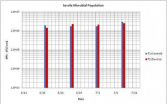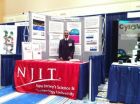EARTH: Trade imbalance, America exports emissions to China
2010-12-11
(Press-News.org) Alexandria, VA – America has made great strides in recent years to reduce carbon emissions by increasing efficiency and turning to other, low or non-carbon energy sources. Meanwhile, carbon emissions in China have grown dramatically during that same time. EARTH looks at this disparity and asks the difficult questions about who is to blame when the coal China is burning is imported from "cleaner" countries and the emissions are produced to manufacture goods exported back to places with lower emissions.
Learn more about this eye-opening subject in January's featured article "A Dirty Secret - China's Greatest Import: Carbon Emissions" and read other news items on topics such as ice caves and developments in using GIS for geoarchaeology research.
INFORMATION:
These stories and more are all found in the January issue of EARTH, available on newsstands, and digitally (both single issue and full subscriptions) through Zinio (http://www.earthmagazine.org/digital/).
For further information on the January story go to http://www.earthmagazine.org/earth/article/3cc-7da-b-16 .
Keep up to date with the latest happenings in earth, energy and environment news with EARTH magazine, available on local newsstands or online at http://www.earthmagazine.org/. Published by the American Geological Institute, EARTH is your source for the science behind the headlines.
END
ELSE PRESS RELEASES FROM THIS DATE:
2010-12-11
ORLANDO - A two-drug combination is safe and active in newly diagnosed acute myeloid leukemia and myelodysplastic syndrome patients who are usually excluded from clinical trials because they have other illnesses or poor performance status - a measure of disease progression - researchers reported this week at the 52nd American Society of Hematology Annual Meeting.
"Our findings suggest current eligibility standards that prevent participation by these patients in phase I and phase II clinical trials might be inadequate," said Guillermo Garcia-Manero, M.D., professor in ...
2010-12-11
Scientists have discovered how a network of repair proteins enables bacteria to prioritise the repair of the most heavily used regions of the DNA molecules that carry the instructions necessary for living cells to function.
The research, carried out by academics at the University of Bristol and published in Molecular Cell (Dec. 2010), reveals that there are greater similarities between the DNA repair systems of bacteria and humans than had been suspected.
When the chemical "letters" in a cell's DNA book of instructions are damaged the instructions become difficult ...
2010-12-11
San Antonio - Metastatic breast cancer patients whose blood contains circulating tumor cells (CTCs) before or after treatment with high-dose chemotherapy and blood stem cell transplant have shorter survival periods, according to a new study by researchers at The University of Texas MD Anderson Cancer Center in Houston.
The findings were presented today in a poster session at the 33rd Annual CTRC-AACR San Antonio Breast Cancer Symposium.
In addition, patients with higher percentages of epithelial cells, or the presence of a specific cellular transition, had higher chances ...
2010-12-11
A gene target for drug resistance, a triple-drug cocktail for triple negative breast cancer, and patients' risk for carpal tunnel syndrome are among study highlights scheduled to be presented by Johns Hopkins Kimmel Cancer Center scientists during the 33rd Annual CTRC-AACR San Antonio Breast Cancer Symposium, held Dec. 8-12. The information is embargoed for the time of presentation at the symposium.
HOXB7 GENE PROMOTES TAMOXIFEN RESISTANCE
(Presentation # PD05-10)
Many postmenopausal women with early-stage breast cancers who initially respond well to tamoxifen become ...
2010-12-11
A gene target for drug resistance, a triple-drug cocktail for triple negative breast cancer, and patients' risk for carpal tunnel syndrome are among study highlights scheduled to be presented by Johns Hopkins Kimmel Cancer Center scientists during the 33rd Annual CTRC-AACR San Antonio Breast Cancer Symposium, held Dec. 8-12. The information is embargoed for the time of presentation at the symposium.
TRIO OF DRUGS MAY COMBAT "TRIPLE NEGATIVE" BREAST CANCER
(Presentation # PD01-05)
Working with cell cultures and mouse models, researchers at the Johns Hopkins Kimmel ...
2010-12-11
A gene target for drug resistance, a triple-drug cocktail for triple negative breast cancer, and patients' risk for carpal tunnel syndrome are among study highlights scheduled to be presented by Johns Hopkins Kimmel Cancer Center scientists during the 33rd Annual CTRC-AACR San Antonio Breast Cancer Symposium, held Dec. 8-12. The information is embargoed for the time of presentation at the symposium.
SIMPLE FINGERTIP TEST MAY IDENTIFY BREAST CANCER PATIENTS AT RISK FOR CARPAL TUNNEL SYNDROME
(Presentation # P2-14-09)
As many as half of postmenopausal women taking aromatase ...
2010-12-11
PITTSBURGH— Nonchemical treatment systems are touted as environmentally conscious stand-ins for such chemicals as chlorine when it comes to cleaning the water-based air-conditioning systems found in many large buildings. But a recent study by University of Pittsburgh researchers suggests that this diverse class of water-treatment devices may be ineffective and can allow dangerous bacteria to flourish in the cooling systems of hospitals, commercial offices, and other water-cooled buildings almost as much as they do in untreated water.
The two-year study by a team in Pitt's ...
2010-12-11
"Directed Self-Assembly of Vertical Nanotubes for Biosensors, Logic, and Nano-Biofuel Cells," will be the focus of NJIT's exhibit today
at the National Nanotechnology Innovation Summit 10 http://www.nsti.org/events/NNI/, at the Gaylord Center in Washington, DC. The event celebrates the 10th anniversary of the national nanotechnology initiative.
NJIT was the only university in New Jersey selected for this exposition featuring practical applications of nanoscience resulting from the last decade of federal funding under the National Nanotechnology Initiative (NNI). ...
2010-12-11
DALLAS – Dec. 10, 2010 – It's a medical Catch-22: carotid artery surgery can itself cause stroke, but so can asymptomatic carotid disease if left untreated.
UT Southwestern Medical Center researchers have now developed a clinical risk prediction rule using factors such as sex, race and health history to assess the danger the surgery poses, while a modified version will help patients make a more fully informed choice about whether to have the procedure.
"It may take a thief to catch a thief, but physicians don't want to cause stroke while trying to prevent stroke, so ...
2010-12-11
GALVESTON, Texas — "You'll be back on your feet in no time" is a phrase familiar to anyone who's ever had to spend time in a hospital. Now, a new study has shown that hospitalized elderly patients who literally "get back on their feet" by taking even short walks around a hospital unit tend to leave the hospital sooner than their more sedentary peers.
Conducted at the University of Texas Medical Branch at Galveston and described in a paper appearing in the current issue of Archives of Internal Medicine, the study draws on data collected from 162 hospitalized patients over ...
LAST 30 PRESS RELEASES:
[Press-News.org] EARTH: Trade imbalance, America exports emissions to China


